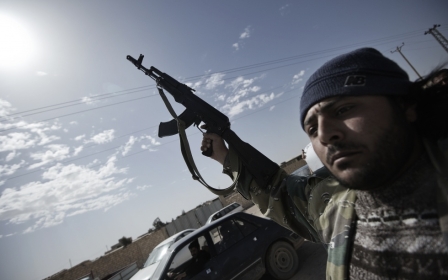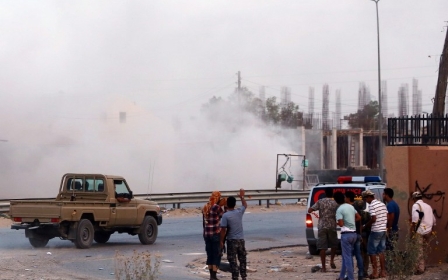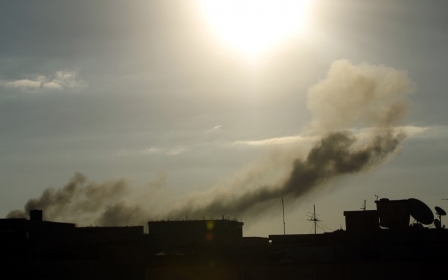Libya's civil war focuses on control of central bank assets

Libya could be on the brink of having its assets frozen by the international community, according to analysts and a former senior official, as the result of an ongoing battle for control of the country’s central bank.
The fight for Libya’s financial resources is becoming increasingly recognised as the fundamental driver in a civil war between rival coalitions of cities, tribes, military forces and parliaments. Hundreds have been killed and 250,000 displaced in fierce clashes across the country between the Islamist-Misrata coalition called Libya Dawn and forces led by Khalifa Haftar, a former Gaddafi general who returned to aid the revolution in 2011 before going rogue.
The capital Tripoli is now under the control of Libya Dawn and the former Islamist-dominated General National Congress (GNC) has reconvened to rival the recently elected House of Representatives, based in the eastern city of Tobruk, which increasingly seems to have given its support to Haftar’s Operation Dignity.
The pivotal battle for control of Libya’s wealth centres on the Central Bank of Libya (CBL), which holds the key to the country’s financial assets due to its possession of more than $100 bn in foreign currency and investments. It also receives and accounts for the sale of Libya’s vast oil reserves, which provide for more than 95 percent of state revenue.
Analysts said the CBL’s role is amplified by its monopoly on Libya’s banking system.
“The CBL is important because it controls monetary regulation and capital flows,” said Mark Dempsey, a former advisor to the Central Bank of Iraq, who has carried out extensive research on Libya’s financial institutions. “The private banking sector is pretty much dead and none of those banks are lending, so they put all their deposits at the CBL.”
“This is the only way for private banks to earn money,” he added.
Politicians on all sides in Libya have sought to seize control of the CBL’s resources since oil output plummeted after the 2011 revolution. IMF data from April said oil production in 2014 will decline by 40 percent compared to 2013 levels and that government revenues will this year suffer a 45 percent dip as a result.
In the midst of rising government spending, the IMF has warned against using the CBL as a route to solving a deepening financial crisis.
“At the end of 2013 combined international reserves at the Central Bank and Libyan Investment Authority (LIA) were estimated at 180 percent of GCP,” the IMF said in its April forecast. “The drawdown of reserves is expected to accelerate from one percent of GDP in 2013 to 30 percent of GDP in 2014.”
“The combination of hydrocarbon output disruptions - caused by the spiralling security crisis - and runaway spending could deplete Libya’s financial reserves in less than five years,” it said.
The CBL has desperately appealed to be left out of the political wrangling between the GNC in Tripoli and the popularly elected HoR in Tobruk.
A statement released by the bank on 1 September said it is the “trustee of the funds of the Libyan people” and serves as “the last line of defence” for the country.
Despite its appeal the bank and its governor have been the subject of intense political pressure.
On 14 September CBL governor Saddek Omar Elkaber was dismissed by the HoR in a motion passed with a majority of 94 out of 102 votes cast. The decision to sack Elkaber was reportedly made after he blocked the transfer of $65 mn from the CBL to the HoR. It is believed that he stopped the money going through because of his personal disagreements with the legislative legitimacy of the newly-elected parliament.
HoR Prime Minister Abdullah al-Thinni has previously said Elkaber “acts as the ruler of Libya and does whatever he wants” while also accusing him of allying with the Muslim Brotherhood, although analysts have cast doubt on his links with the group.
“I don’t think Elkaber is very close to the Muslim Brotherhood,” said Wolfgang Pusztai, a freelance security and policy analyst who served as Austrian Defence Attaché to Libya from 2007-2012. “The only indication for this was the implementation of Islamic Banking in Libya [proposed by the CBL in 2012], but the volume for this was quite limited and I can imagine he was giving into pressure from the Islamists – he was probably quite scared.”
“He has previously worked for the Gaddafi regime and is chairman of the Bahrain-based Arab Banking Corporation, which is 60 percent owned by the CBL and the Kuwait Investment Authority. None of these roles are very typical for a Muslim Brotherhood supporter,” he added.
The GNC too put pressure on Elkaber until its mandate came to an end in June, most evidently when it advertised his job as vacant in July 2013. This prompted rumours that the CBL governor had been sacked, although ultimately nothing came of the advertisement and he remained in his position.
Although the HoR has officially removed him from his position, Elkaber has indicated he will not accept the decision made in Tobruk.
Speaking from a conference in Algeria after the announcement, Elkaber said he had received no official notification of the decision to fire him and was awaiting for the official procedure to be followed by the HoR. He said until that moment comes, he will continue to consider himself the serving CBL governor.
Analysts said his response to the HoR decision indicates that he will oppose it in legal terms.
“Elkaber implied in his statements that even if he were to receive official notification he would fight against the decision using judicial means,” said Claudia Gazzani, senior Libya analyst at the International Crisis Group (ICG). “He is using the same argument as members of the former GNC who said the Tobruk parliament is illegal. My feeling is that Elkaber will not respect the decision, as he does not recognise the HoR as the legitimate representative of the Libyan state.”
The GNC has claimed the HoR did not officially handover power and, coupled with not being based in Tripoli, it is not the country’s valid legislative body, despite the fact that much of the international community has recognised it as such.
The HoR for its part has appointed Elkaber’s deputy Ali al-Habri as the interim CBL governor until a permanent replacement is found. Gazzani said the appointment was made due to Habri’s support for the HoR.
“Habri is very much in favour of Tobruk – he is physically in al-Bayda [eastern Libya] – and is wholeheartedly supporting the government there,” she said.
It would seem that the CBL now has two competing governors, to go with the country’s two rival parliaments. Elkaber is back in the Libya Dawn controlled capital Tripoli, and it remains unclear how the HoR will implement its decision without access to the CBL headquarters that are based there.
This split has given rise to the spectre of two CBLs emerging over the coming weeks, according to the ICG’s Gazzani.
“The Tobruk government could take over the Benghazi branch of the CBL to act as its headquarters, but it is not clear what this would mean in terms of liquidity and funds,” she said. “Up until now, the CBL in Tripoli has transferred funds to Benghazi. If there is separation of the CBL the question is: how will the Benghazi branch get money? It would require redirecting payments for oil sales from Tripoli’s main account into other subsidiary accounts.”
“That would mean a complete overhaul of the payment process for oil revenues,” she added.
The CBL’s Tripoli branch revealed in July that it had been securely delivering funds to banks across the country by helicopter, in order to secure bank liquidity. The central bank had previously been struggling to distribute cash due to a soaring number of armed robberies when delivering by road.
The potential for two rival central banks has prompted increased fears of Libya’s international assets being frozen, which the CBL has previously warned “would lead to a loss of sovereignty and would not be in the interest of the country and its security and stability.”
Some $150 bn of Libya’s assets were frozen during the 2011 rebellion against Gaddafi’s rule, which effectively suspended independence until they were released after interim authorities took control of the country.
The former chairman of the LIA, which oversees $60 bn of Libya’s assets, said politicians have refused to respect public institutions, which has led to the potential for international intervention in the country’s financial affairs.
“In Libya politics does not spare institutions and there is no real concept of the public servant,” said Mohsen Derregia, who served as chairman of the LIA for a year from April 2012. “All positions are seen as part of the spoils of political wars – this illustrates the unstable nature of Libyan institutions.”
“With this in mind, if the UN sees risk to Libyan assets, it may decide to freeze them in order to prevent their political and military use,” he added.
The UN Security Council passed a resolution in March that prohibited “attempts to illicitly export crude oil from Libya” and underlined “the primary responsibility of the Libyan authorities in taking appropriate action” in stopping trade by non-state actors.
It remains unclear if the UN would intervene, should oil revenue receipts become disputed between two rival CBLs in Tripoli and Tobruk. International bodies are yet to given an indication they are considering an asset freeze.
The ICG’s Gazzani, however, said an asset freeze could be used to pressure reconciliation between the warring political and military groups.
New MEE newsletter: Jerusalem Dispatch
Sign up to get the latest insights and analysis on Israel-Palestine, alongside Turkey Unpacked and other MEE newsletters
Middle East Eye delivers independent and unrivalled coverage and analysis of the Middle East, North Africa and beyond. To learn more about republishing this content and the associated fees, please fill out this form. More about MEE can be found here.




